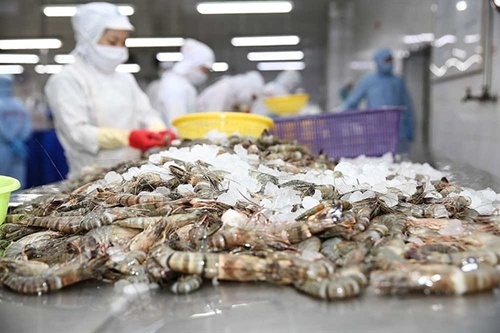The objection was made after the CBP had applied the Enforce and Protect Act (EAPA) to conclude that frozen shrimp products exported by the Minh Phu Seafood JSC to the US market should be subject to tax in accordance with the anti-dumping duty order imposed on shrimp from India. It said the company did not provide sufficient evidence as requested by the CBP to prove that the company was not using shrimp originating from India for export to the US.
    |
 |
|
Processing shrimp for exports. (Photo for illustration) |
A representative of the Minh Phu Seafood JSC said the CBP’s conclusion was not accurate and it would appeal against the above decision.
CEO of the Minh Phu JSC Le Van Quang said the decision was a big surprise for the company because as soon as it had received the CBP’s notice of an investigation, Minh Phu had fully cooperated with the investigating agency and demonstrated clearly how the company handled and separated shrimp of Vietnamese origin and Indian origin on the production line to ensure that only Vietnamese shrimp was exported to the US.
“Although we actively cooperated and invited investigators from the CBP to visit us in Vietnam, they did not conduct field verification. This has led to the CBP's inaccurate assessment of Minh Phu's imported shrimp and Vietnamese raw shrimp traceability system,” Quang said.
Quang said the CBP had its own evaluation criteria for shrimp separation methods, and asserted that Minh Phu should have used this tool to trace the raw shrimp. It rejected the traceability management method that Minh Phu had been using for more than four years.
He said as Minh Phu did not follow the method requested by the CBP, the agency had applied “available adverse facts” and concluded that Minh Phu had violated the EAPA law.
“This requirement of the CBP is not completely consistent with the production characteristics of the shrimp industry. According to research by the company, no shrimp exporting enterprises have such a traceability system,” he added.
In fact, Minh Phu has clearly demonstrated its separation and traceability method approved by the National Oceanic and Atmospheric Administration (NOAA) under the US Department of Commerce, based on its requirements for the Seafood Import Monitoring Programme.
“Minh Phu completely stopped importing raw shrimp from India at the end of July 2019 because domestic raw materials were fully capable of supplying our factories,” Quang said.
Minh Phu has successfully applied and effectively operated a high-tech shrimp farming model at its two farming areas Minh Phu Kien Giang (600ha) and Minh Phu Loc An (300ha). It has also been establishing a network of shrimp suppliers across the Mekong Delta and southwest, with diverse models of sustainable shrimp farming.
“We believes the CBP's decision was made based on an unreasonable request and was not based on compelling evidence. Therefore, Minh Phu will exercise its right to appeal against this decision. Minh Phu is confident of putting forward a convincing appeal because the CBP's decision was not based on any authentic arguments,” Quang stressed.
According to Quang, the review process was expected to take place within 60 days from the date the appeal is recorded. In case the appeal did not produce the desired results, Minh Phu would appeal to the Court of International Trade. Whilst waiting for the outcome of the appeal, Minh Phu would make every effort to ensure the CBP's ruling did not affect its export business to the US.
On January 14, 2020, the CBP announced the initiation of an investigation into anti-dumping tax evasion that is currently applied to Indian shrimp exports. It has also investigated MSeafood Company, a subsidiary of the Minh Phu JSC in the US, on suspicion the company had imported raw shrimp from India for preliminary processing and exports to the US in the guise of shrimp originating from Vietnam.
Source: VNA